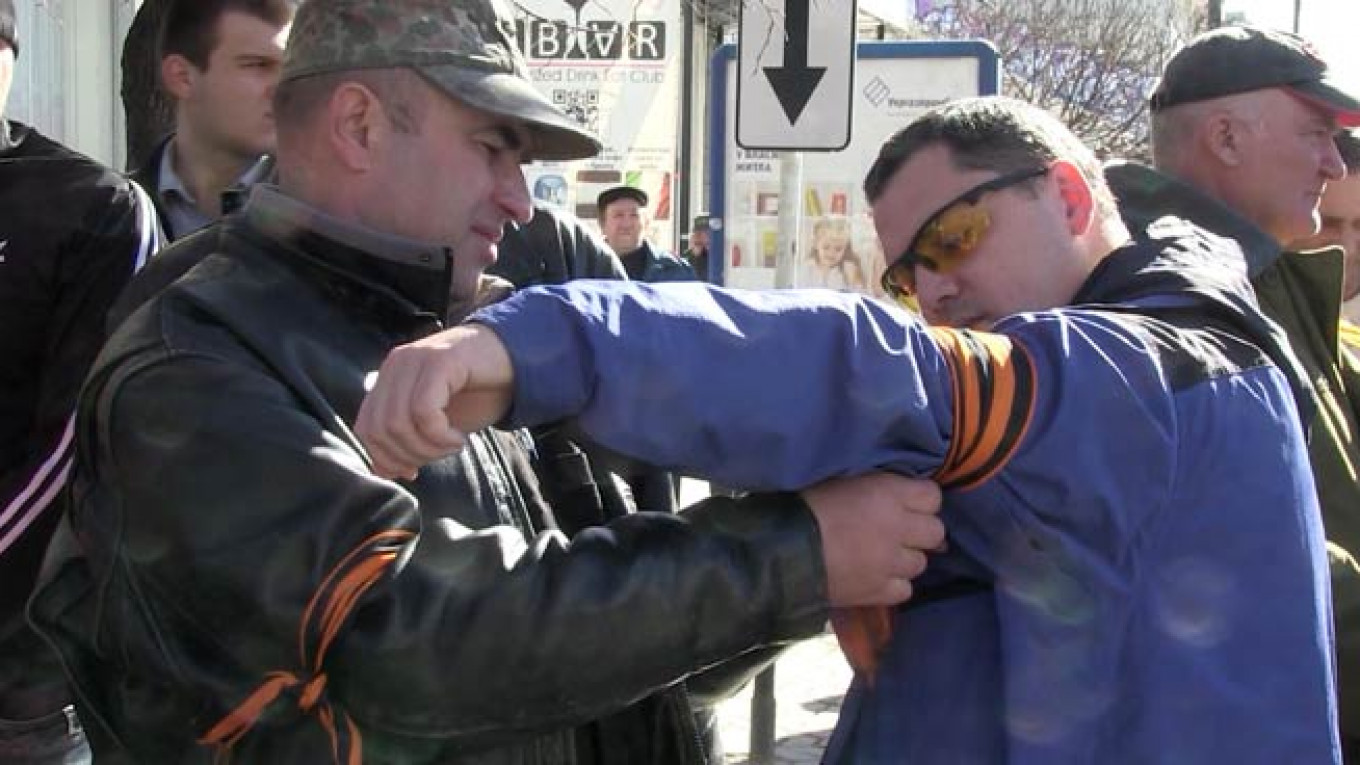On every recent television broadcast about Russia's annexation of Crimea or the eastern part of Ukraine, viewers have been bombarded with images of people wearing orange and black-striped ribbons — the symbol of the unofficial "Putin's Army."
Russian propaganda avows that the ribbon — known as the St. George ribbon in Russia — symbolizes the Soviet Union's "Great Victory" in World War II. Yet, the connection between President Vladimir Putin and "Putinism" to that victory remains unclear, especially because the St. George ribbon first gained use as a propaganda tool as recently as May 9, 2005. That was when the pro-Kremlin youth group Nashi had college students and school children hand out a huge amount of the ribbons to passers-by in honor of the 60th anniversary of the Soviet Union's victory in World War II. That initiative set off an unexpected wave of patriotism across the country: Russians everywhere tied the ribbons to their jackets, cars and apartment balconies, and this fervor continued for a full year after the anniversary had passed. Those ribbons made headlines for a second time following the rigged State Duma elections in 2011, which sparked a series of mass anti-Putin demonstrations in Moscow. For whatever reason, the protesters wore white ribbons as the symbol for their movement. This prompted Kremlin spin doctors to come up with the brilliant idea of using the St. George ribbons to oppose the white ribbon. They organized counter-demonstrations by bussing in thousands of state employees from all over and tying a St. George ribbon on the arm of each. Then Putin himself made an appearance wearing a St. George ribbon at one such rally on Red Square. The message was clear: bad, unpatriotic people wear white ribbons but good people wear St. George ribbons in memory of those killed in war.
The authorities also dug up the few remaining World War II veterans and paraded them before the cameras, decked out in so many St. George ribbons that they looked like wedding cakes with legs. And now, as we have seen with Ilya Ponomaryov, in order to discredit a member of the opposition, the authorities need only claim that he does not respect the Great Patriotic War. In fact, officials shut down Russia's only opposition television channel, Dozhd, on that pretext.
This cult of the St. George ribbons and war veterans has taken on grotesque proportions. Not only are officials and ordinary citizens ready to take offense at any passing remark, but they seem to have forgotten the far more obvious and important question of the veterans themselves. For example, this year marks the 69th anniversary of the victory in World War II. It happens that the average lifespan for Russians is also 69 — and for men it is even shorter. The point is, if any veterans are still alive, they must be very few in number. Every year the city honors its veterans of the Great Patriotic War and posts its reports online. In 2004, Moscow had 108,000 veterans. Five years later, in 2009, the number had more than doubled to 272,000. In another three years, in 2012, the original number had tripled to 340,000 veterans.
Did officials falsify these figures, just as they do with election results? Not at all. Over the course of his years in power, Putin issued several addendums to the law on veterans, effectively granting veteran status to all the people who "labored on the home front." That means it now extends to everyone who worked in the defense industry during the war, every man, woman and suckling child who survived the blockade of Leningrad.
As veterans, all of those people now receive discounts on utilities fees, free public transportation and so on. All of those people are extremely grateful to Putin as their benefactor, and they enthusiastically vote for him in elections. So when the war with Ukraine began, the "Putin Patriots" already knew how to distinguish themselves from ordinary people: with a black and orange ribbon.
Andrei Malgin is a journalist, literary critic and blogger.
A Message from The Moscow Times:
Dear readers,
We are facing unprecedented challenges. Russia's Prosecutor General's Office has designated The Moscow Times as an "undesirable" organization, criminalizing our work and putting our staff at risk of prosecution. This follows our earlier unjust labeling as a "foreign agent."
These actions are direct attempts to silence independent journalism in Russia. The authorities claim our work "discredits the decisions of the Russian leadership." We see things differently: we strive to provide accurate, unbiased reporting on Russia.
We, the journalists of The Moscow Times, refuse to be silenced. But to continue our work, we need your help.
Your support, no matter how small, makes a world of difference. If you can, please support us monthly starting from just $2. It's quick to set up, and every contribution makes a significant impact.
By supporting The Moscow Times, you're defending open, independent journalism in the face of repression. Thank you for standing with us.
Remind me later.






